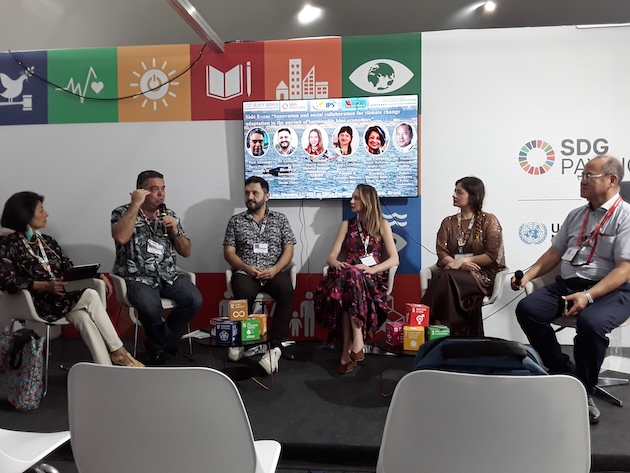Climate Action, Climate Change, Conferences, COP30, Global, Headlines, Latin America & the Caribbean, Ocean Health, TerraViva United Nations

Oceans contribute to climate regulation by absorbing over a quarter of human-caused CO₂ emissions and around 90 percent of excess heat but attract only 1.7 percent of everything that’s invested in science.

Moderators Masanori Kobayashi (far right) and Farhana Haque Rahman, Senior Vice President and Executive Director, Inter Press Service (far left), at a COP30 side event titled ‘Innovation and social collaboration for climate change adaptation in the pursuit of sustainable blue economies.’ Credit: Joyce Chimbi/IPS
– The oceans are a fundamental part of Earth’s climate system, regulating it by absorbing and storing vast amounts of solar heat, redistributing that heat around the globe through currents, and absorbing a significant portion of human-caused carbon dioxide (CO₂) emissions—yet scientific research into them remains underfunded.
Oceans contribute to climate regulation by absorbing over a quarter of human-caused CO₂ emissions and around 90 percent of excess heat. But COP30 participants heard during a side event titled ‘Innovation and social collaboration for climate change adaptation in the pursuit of sustainable blue economies’ that the amount of money invested in ocean science is only about 1.7 percent of everything that’s invested in science.
During the side event, Meredith Morris, Senior Director of Strategic Philanthropy (Planet) at XPRIZE spoke of opportunities to tackle humanity’s toughest challenges with bold, scalable breakthroughs. XPRIZE, she said, does its part by inviting the world’s brightest minds to turn audacious ideas into lasting impact for people and the planet.
Owned by the XPRIZE Foundation, the nonprofit organization designs and operates large-scale incentive competitions.
It has supported numerous projects across various fields, including space exploration, carbon removal, global health, and education, by using large-scale incentive competitions to drive breakthrough innovations.
“I lead the portfolio around energy, climate, and nature. We are a 30-year-old incentivized prize model that sets a bar for the change we want to see in the world and incentivizes innovators to reach that bar or exceed it. We do not honor and celebrate work that’s already being done.
“At XPRIZE, what we’re trying to do is really catalyze systemic change.” Morris continues, “We believe in philanthropy, but we also believe it has to create value. And at the end of investing in doing something like protecting nature or addressing climate change, there should be viable businesses and industries on the other side of that.”
Moderated by Masanori Kobayashi, Senior Research Fellow of the Sasakawa Peace Foundation and Farhana Haque Rahman, Senior Vice President and Executive Director of Inter Press Service, the side event was an insight into life-transformative scientific projects that can only be born at the intersection between science and funding.
Haque Rahman spoke extensively of the urgent need to communicate science in a manner that helps connect with the places on the frontlines of the climate crisis. Masanori Kobayashi confirmed the need to amplify blue economy solutions, as raising awareness can and does lead to more action.
The XPRIZE Carbon Removal, a USD 100 million competition, incentivized the development of scalable solutions for removing carbon dioxide directly from the atmosphere or oceans. Winning projects included using enhanced rock weathering on farms to lock away CO₂ and technologies that permanently store CO₂ in concrete.
The Shell Ocean Discovery XPRIZE challenged teams to develop autonomous underwater technologies for rapid, high-resolution ocean floor mapping. The winning technology helped dramatically reduce the time estimated to map the entire ocean from centuries to just a decade.
Alexander Turra, Professor at the Oceanographic Institute of the University of São Paulo and head of the UNESCO Chair on Ocean Sustainability, based at the Oceanographic Institute and the Institute of Advanced Studies of the University of São Paulo, spoke about Brazil’s Oceans Without Plastics initiative.
Formally known as the National Strategy for a Plastic-Free Ocean, the initiative is a comprehensive, six-year plan (2025–2030) launched by the federal government to address marine pollution by targeting the entire lifecycle of plastics, from production to disposal.
The primary goal is to prevent, reduce, and ultimately eliminate plastic waste from entering Brazil’s marine and coastal environments. Brazil, with a vast Atlantic coastline, is a top-ten global contributor to marine plastic pollution, an issue that impacts biodiversity, human health, fishing, and tourism.
Also on the panel was Leonardo Valenzuela Perez, who serves as the Director of International Partnerships at Ocean Visions, where he leads the Global Ecosystem for Ocean Solutions. He spoke to participants about carbon removal at scale and the place of science in these efforts. What is needed is an unparalleled level of investment, mobilization of resources, and scale of action.
“We Colombians are the only country in South America with both the Pacific and Caribbean coasts, and we have various ecosystems as well as culturally diverse traditional peoples and communities,” said Laura Catalina Reyes Vargas, Founder and Executive Director of Ocean Hub.
“And, mostly, Afro-descendants and Indigenous communities on both coasts happen to be the poorest people in the country. It’s all about racism sometimes, economic inequality, infrastructure, poverty and lack of sanitation—it’s about almost all of the challenges that are being addressed throughout the 17 SDGs.”
“When it comes to the blue economy,” she continues, “We prioritize not only talking about scientific research. As a scientist myself, of course, I truly believe we will be able to address and understand the major steps needed to achieve not only the SDGs but also national plans with very high standards, as we have in Colombia.”
It was also crucial to address the regional organizational challenges.
COP30 has demonstrated a commitment to placing oceans at the center of global climate initiatives and announced the Task Force on Oceans earlier this week during a high-level ministerial meeting. Led by Brazil and France, the initiative integrates oceans into a global mechanism that accelerates the adoption of marine solutions in national climate plans —encouraging countries to set protection targets for the ocean when updating their NDCs.
IPS UN Bureau Report
